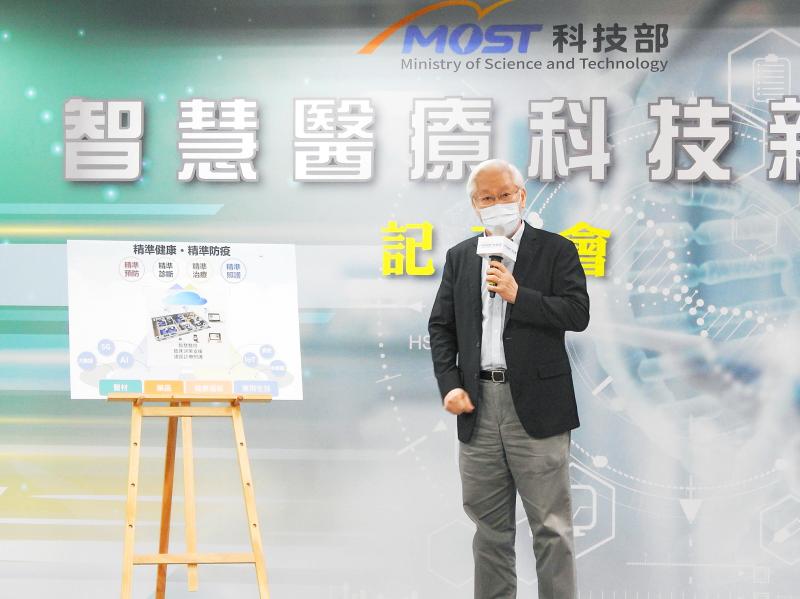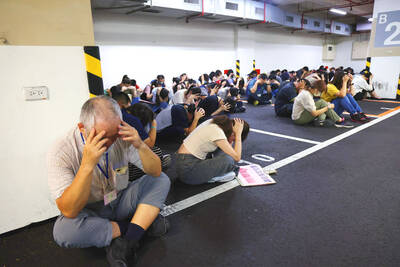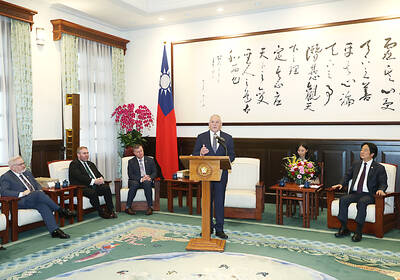Precision medicine is expected to be a flagship industry of the Taiwanese economy in the next decade, as the COVID-19 pandemic has accelerated the digital transformation of local industries, Minister of Science and Technology Wu Tsung-tsong (吳政忠) said yesterday.
Local biomedicine start-ups have over the past few years proved to be innovative, Wu told a news conference in Taipei, adding that the ministry continues to support academics in their efforts to commercialize their innovations.
Quality healthcare and advanced information and communications technologies are among Taiwan’s strengths, creating a conductive environment for the development of smart medicine, and the integration of hospital treatment and home-based healthcare, he said.

Photo courtesy of the Ministry of Science and Technology
At the event, a team of National Taiwan University Hospital’s Yunlin branch and Quanta Computer Inc personnel introduced a distance diagnostic system that would allow doctors to monitor patients’ basic health indicators without meeting them in person.
After local COVID-19 infections surged in the second half of May, the team offered 30 packages of the system to health authorities to use in quarantine facilities, Yunlin branch vice superintendent Matthew Ma (馬惠明) said.
The system is based on artificial intelligence and Internet of Things technology, Quanta Computer business headquarters associate vice president Song Chen-hwa (宋振華) said, adding that the team is looking to promote the system to Taipei Veterans General Hospital and other hospitals.
Other innovations presented at the event included an indoor positioning and tracking system developed by Academia Sinica distinguished visiting chair Jane Liu (張韻詩) and National Yunlin University of Science and Technology associate professor Edward Chu (朱宗賢).
The system, which can track the locations of patients and medical devices, helps patients call for assistance, said Chu, who consults for BiDaE Technology Inc, a start-up founded last year.
A team led by Taipei Medical University professor Chen Ray-jade (陳瑞杰) presented its Contactless Intelligent SafePass Kiosk, which helps people register personal information and contact history by using their National Health Insurance cards.
Chen, who founded the start-up Radica Health in 2019, said that the kiosk is in use in more than 30 hospitals nationwide.
A team led by National Central University professor Lo Men-tzung (羅孟宗) presented a health data monitoring system that helps medical personnel track the health status of patients with chronic conditions remotely.
Many teams started developing their products before the pandemic, Department of Academia-Industry Collaboration and Science Park Affairs Director-General Andrea Hsu (許增如) said.
COVID-19 is a crisis, but it also provides business opportunities for start-ups, she said.

Taipei on Thursday held urban resilience air raid drills, with residents in one of the exercises’ three “key verification zones” reporting little to no difference compared with previous years, despite government pledges of stricter enforcement. Formerly known as the Wanan exercise, the air raid drills, which concluded yesterday, are now part of the “Urban Resilience Exercise,” which also incorporates the Minan disaster prevention and rescue exercise. In Taipei, the designated key verification zones — where the government said more stringent measures would be enforced — were Songshan (松山), Zhongshan (中山) and Zhongzheng (中正) districts. Air raid sirens sounded at 1:30pm, signaling the

The number of people who reported a same-sex spouse on their income tax increased 1.5-fold from 2020 to 2023, while the overall proportion of taxpayers reporting a spouse decreased by 4.4 percent from 2014 to 2023, Ministry of Finance data showed yesterday. The number of people reporting a spouse on their income tax trended upward from 2014 to 2019, the Department of Statistics said. However, the number decreased in 2020 and 2021, likely due to a drop in marriages during the COVID-19 pandemic and the income of some households falling below the taxable threshold, it said. The number of spousal tax filings rebounded

A saleswoman, surnamed Chen (陳), earlier this month was handed an 18-month prison term for embezzling more than 2,000 pairs of shoes while working at a department store in Tainan. The Tainan District Court convicted Chen of embezzlement in a ruling on July 7, sentencing her to prison for illegally profiting NT$7.32 million (US$248,929) at the expense of her employer. Chen was also given the opportunity to reach a financial settlement, but she declined. Chen was responsible for the sales counter of Nike shoes at Tainan’s Shinkong Mitsukoshi Zhongshan branch, where she had been employed since October 2019. She had previously worked

‘NON-RED’: Taiwan and Ireland should work together to foster a values-driven, democratic economic system, leveraging their complementary industries, Lai said President William Lai (賴清德) yesterday expressed hopes for closer ties between Taiwan and Ireland, and that both countries could collaborate to create a values-driven, democracy-centered economic system. He made the remarks while meeting with an Irish cross-party parliamentary delegation visiting Taiwan. The delegation, led by John McGuinness, deputy speaker of the Irish house of representatives, known as the Dail, includes Irish lawmakers Malcolm Byrne, Barry Ward, Ken O’Flynn and Teresa Costello. McGuinness, who chairs the Ireland-Taiwan Parliamentary Friendship Association, is a friend of Taiwan, and under his leadership, the association’s influence has grown over the past few years, Lai said. Ireland is